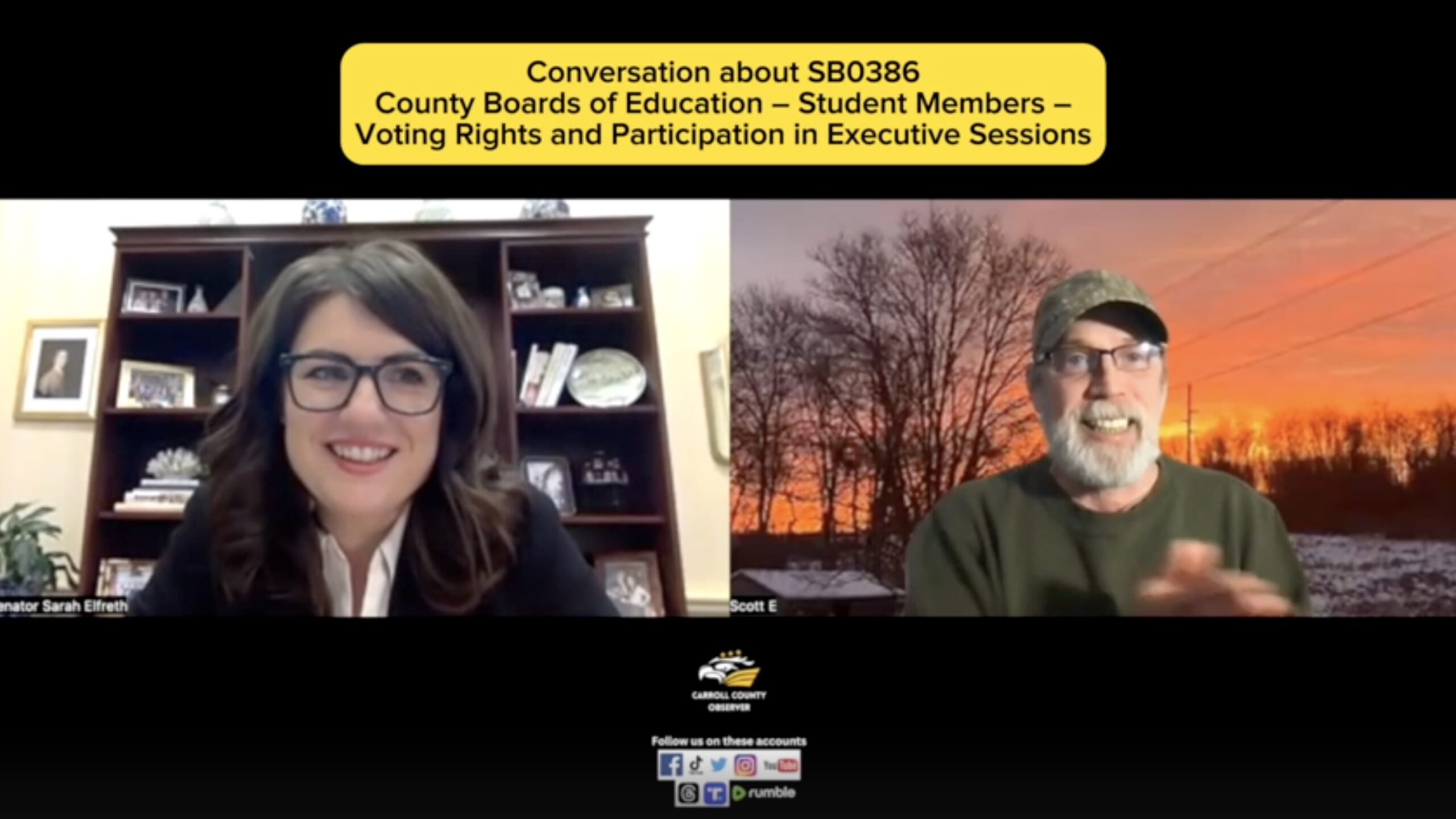On January 24th The Observer had a conversation with Maryland State Senator Sarah Elfreth (District 30 – Anne Arundel County) about SB0386 – “County Boards of Education – Student Members – Voting Rights and Participation in Executive Sessions”.
Senator Elfreth is one of the sponsors of this legislation and I felt the best source to learn about it and ask questions that I had and that others had talked to me about in regards to this legislation.
You can view that conversation here:
You can view the legislation proposed in 2024 for SB0386 here: https://mgaleg.maryland.gov/2024RS/bills/sb/sb0386f.pdf
You can view the House version (HB0456) here https://mgaleg.maryland.gov/2024RS/bills/hb/hb0456F.pdf
For some background…Maryland Matters wrote on this topic with the similar legislation proposed in 2023: https://www.marylandmatters.org/2023/02/21/maryland-lawmakers-introduce-bills-expanding-student-school-board-member-voting-rights/
On a local Carroll County perspective, I have seen comments or posts from three local elected officials about this legislation:
Carroll County Board of Education member Steve Whisler (January 23rd):
I strongly oppose SB386 and HB456, which would grant voting rights to the Student Member of the Board of Education.
I really do value the advice and input of our SMOB. However, SMOBs, as young as 16 years old, are elected by high school classmates — not Carroll County voters.
Just a few of the major responsibilities of the Board of Education:
– governs an operating budget of almost $500 million annually
– determines where and how hundreds of millions more in taxes are spent for school maintenance and building projects
– negotiates contracts and occupational standards for five employee groups
– sets staff and teacher salaries, including any annual cost of living adjustments
– approves staffing moves and placement of senior staff in our 44 facilities
– obligates taxpayers to fund health care programs, teacher pensions, and long-term borrowing
– sets curriculum and major school policies that reflect the views of our county voters.
Minors are not permitted by law to execute contracts, purchase cigarettes and alcohol, have checking accounts, or hold public office. Giving the SMOB voting rights on our Board of Education would only weaken the voice of those who are elected.
With all due respect to our SMOB, minors lack the skills necessary to discern how these major issues will impact county residents. Instead, their focus should continue to be advisory in nature. Their primary focus should be their studies while in high school — not these incredibly complex issues that impact the lives of every voter.
Maryland State Delegate Joshua Stonko (District 42C) (2 comments on January 24th):
I still don’t understand how a voting student member of a board on an elected board is not unconstitutional. It clearly violates one person one vote unless it is an appointed board of education (like the case that the Senator was apart of on the Board of Regents which are all appointed positions). Additionally, the high school student member position is a defacto representative of the teacher union. I was very involved in this stuff in high school circa 2010/2011 and it is a horrible idea. I would strongly argue that if this bill passed the board has legal grounds to have it thrown out. I will obviously fight this in Annapolis.
Thinking more about this and given I think this could have legs given the sponsors. I think I am going to submit a bill to make the Carroll County student member an appointment member that is appointed by the elected board. April Rose Richards – Can we discuss this?
Carroll County Board of Education member Tara Battaglia (January 23rd):
Stupid. Dumb. Ignorant. Incompetent. Murderers. Worthless.
These are words that BOE members have endured over the years. Yes, when you take on an elected position, you need to be prepared to receive criticism. The question is, should a child have to endure the same? Isn’t it considered child abuse?
So many are taking a political stance regarding student reps being a voting member on the BOE. I’m taking a mental health crisis stance. Yes, there are teens that are more mature than others, however one can only take so much criticism. For teens, there is absolutely no exception. At some point, harmful words will affect a child and their self esteem.
A teenager student rep will not be excluded in online criticism. If someone were to criticize the BOE online, that criticism will include the student rep. The student rep will become part of disagreements, attacks, or even worse…cyber bullying.
As adults, we hear from our children about the bullying issues and how it makes them feel. As adults, we want accountability if a student harms themselves due to online attacks. My question is, and god forbid it happens, who would be accountable if a student rep harmed themselves due to the criticism they would receive because they mentally can not handle the pain.
I oppose the Bills proposed for Student Representatives to have voting rights on the BOE because of the mental abuse they could endure. No child should ever be treated in such a way.
I reached out to the four current Board of Education candidates in Carroll County for their thoughts on this topic. Here is what they provided for this article:
Greg Malveaux:
The reality is that School Board decisions can be contentious; many would agree that this has increased with time. I hope, if elected to the Board, to build collaboration between Board members, local leaders and stakeholders. I think the student member of the Board of Education plays an important role, bringing unique, internal perspective from within the school to share with the Board. I understand because I share in that realm, also spending my days within the walls of classrooms and deep in curriculum, but as an instructor. Yet, back to the climate within the Board; there is pressure from outside groups to try to influence BOE decisions, and unfortunately, it can be in the form of intimidation, bullying, chastising, and more. It is one thing to expect seasoned adults to navigate through this, but quite another for a minor. One question is, will student Board members always be able to stand their ground and do the right thing when it means casting the unpopular vote? The more important question is should they have to? I would say “no,” and as a parent of the student, I would also be concerned with denunciation and potential aggression aimed at my child. Quite simply, this burden should not be placed upon them.
The professional, as well as everyday life experiences of the Board members come into their decision-making and voting. More likely, they have experienced repercussions for questionable decisions, and this influences how they vote. A minor does not have the same understanding for what consequences may result from a questionable decision, or in this case, a vote.
We don’t give the right to vote for this age group, or under 18 years old, in general elections, and the student Board member is not elected to the position by the general public. A concern is what other concessions may come about to give individuals the power to cast votes with the BOE?
For these reasons, I would not support allowing student BOE members the power of the vote.
Muri Dueppen: (Comments submitted on January 28th)
I reject sweeping arguments that minors generally do not have the capacity to make independent, informed decisions on important issues that impact them nor that they cannot be strong and resilient enough to weather criticism or attempted persuasion. I note that under Maryland law, minors 17 years of age may vote in Primary Elections as long as they are 18 on the date of the General Election. Minors 17 years of age may marry with parental permission. There are also several circumstances in Maryland law in which a juvenile may be criminally tried as an adult. Finally, to my knowledge none of the individual Carroll County politicians who oppose Student Members of the Board voting rights have objected to these individuals hearing public comment that uses sexually explicit language (perhaps because 17 year-olds are allowed to watch R-rated movies without being accompanied by a parent or guardian).
I am personally supportive of Student Members of the Board having at least limited voting rights, provided they are at least 17 years old and have parental permission – although I think the proposed legislation in its current form is incomplete (for example, it should include provisions for breaking tie votes when there are an even number of voting members).
Kristen Zihmer:
The Carroll County Board of Education manages hundreds of millions of dollars on behalf of Carroll County Public Schools, enacts and oversees policy, and regularly must make very challenging and consequential decisions. It is my position that each local jurisdiction, rather than the state, should determine for itself whether a high school student should be permitted to assume that role and responsibility.
Amanda Jozkowski:
I am on the record in the Carroll County Times (11/6/22) in support of voting rights for student representatives and have long been consistent on this issue. Many of the arguments I have made parallel those shared with you today by Senator Elfreth. In addition, I served on my state’s Board of Education as a student representative when I was in high school and found this to be an incredible opportunity to learn about government processes, engage directly with community leaders, and to listen to and represent my peers in a professional manner.
I do have some questions about the bill in its current form and have reached out to Senator Elfreth for some clarity around how, for example, a split vote of the Board with six voting members would be handled. And while I have been extremely impressed by recent SMOBs in CCPS, I also think there is room to take a look at the student representative selection process in our county to ensure that the most qualified students are selected and that nominees are representative of the student body.
Finally, in response to your question about undue influence, I’m sure you’ll agree with me that if that were indeed an issue, it would reflect a problem not with the student (who desired to take on this great responsibility), but rather with the adults – if Board members or community members put pressure on a student representative, that should of course be viewed as inappropriate and reprehensible. This possibility should spark deep introspection on the part of adults who purport to know better than a highly engaged 16-18 year old who is a product of our great school system.
###
If additional comments are made (and seen) or provided to The Observer this article will be updated.
Be sure to follow the various social media accounts for The Observer:
- https://facebook.com/CarrollObserver
- https://tiktok.com/@carrollobserver
- https://twitter.com/CarrollObserver
- https://instagram.com/carrollobserver/
- https://youtube.com/@carrollobserver
- https://truthsocial.com/@carrollobserver
- https://rumble.com/c/c-4218154






